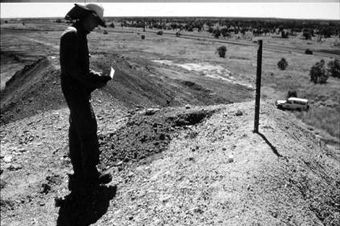Sarde McFadzean - laboratory technician & student
Although the mining industry makes an essential contribution to our way of life and contributes many billions of dollars to the economy, it has a major impact on the environment. In Australia, however, mining companies are required to rehabilitate minesites so the land can be returned to other productive uses once mining has finished.
I am a part-time laboratory technician with the CSIRO Minesite Research and Rehabilitation Program in Townsville. I first began there on work experience as part of CSIRO's Aboriginal and Torres Strait Islander Recruitment and Career Development Strategy. I am also studying full-time for a Bachelor of Science degree at James Cook University.
So far my work has involved visiting bauxite and coal mines from southern Queensland to Weipa. At the mines, I take soil and plant samples which are analysed in the laboratory for pH (level of acidity), electrical conductivity (related to salt concentrations) and the presence of particular metals. I am part of a team which assesses potential problems in minesite rehabilitation and helps establish new landscapes once mining has ceased.
Depending on their location and the views of the landowners or local community, minesites can be rehabilitated for different uses. The rehabilitation process starts when the soil and rock layers that are removed to expose the ore are stockpiled or placed directly on previously-mined areas. The soil and rock layers can then be reshaped to blend in with the surrounding landscape and planted with trees and other vegetation to create sustainable ecosystems. Once the vegetation is established, the land may be used for grazing cattle, or planted with native species so the area gradually returns to a natural state.
It's not easy working and studying and I really have to be organised, but it is still possible to find time for friends and playing sport.

This work is reproduced from the Women in Science Enquiry Network
PO Box 647 Glebe 2037,
http://www.usyd.edu.au/wisenet
"Science Futures" was produced by Wisenet with the aid of a grant from the Department of Industry, Science and Tourism Science and Technology Awareness Program.